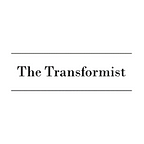The algorithm for change
As I sat on the bus on my way to work this rainy morning, I looked through the window at the people pacing through the rain. The cars passing by careful not to shower anyone. Everyone looking both confused and irritated by such sudden change in weather after last week’s heat wave in the Netherlands.
Looking at the dynamic outside while listening to Prodigy, I felt this strong nostalgia for when I was a kid, listening to bad-ass bands, from Prodigy to N.W.A. and Onyx, feeling all bad-ass myself imagining how my bad-assness would lead me into my happy future.
But then something hit me, how could I end up liking those bands back then? And most importantly, how did it affect me in becoming who I am today? Did I ever really like those bands, or did I just want to appear to be a certain way to the outside world, to belong to a certain “bad-ass clan”?
I mean I had a reason to wonder, I went to a musical school religiously to learn how to play classical piano, I listened to jazz with my grandfather, I sang Russian romances in a choir… I was also not like everyone else at my middle school back then: I liked studying (unlike most of my new-money classmates), I had interests, I had an opinion on the world around me while the rest only cared about class politics and pocket money. Oh, and I really didn’t care for being “normal”.
But still I had to ask myself whether I did it because somewhere deep down inside, I still wanted to belong? Or was there a different mechanism at play?
Thinking of what that music would do to me back then, strong base and strong texts spoken with intensity, the pictures in my mind it would create, those of freedom and triumph. I realized it was my way to rebel, to set myself free, it reflected my energy and not my aesthetic preferences or desire to belong.
It was my way to rebel because although I have learnt to love and appreciate classical music, in fact it has become the essence of who I was at the very core — the ideal to aspire to, it still came from rational vs natural and instinctive. Rational versus instinctive is something that has puzzled humans for a long time, and I am no exception, so I always reflect and ask myself — which force is driving? Well, I have come to believe that ratio shapes our natural tendencies to make us who we are, it’s never in the driving seat, it’s a tool we are blessed with to reflect and transform among other things.
Reflecting on this nostalgic episode made me wonder, how exactly did certain events and decisions in my life shape who I am today? What happened when I gave into my natural tendencies? What kind of purpose was written between the lines, given to me by my “nature”? I know that as a result of my love for Prodigy, I would sing to the texts, imagine myself meeting Keith Flint, singing with him on the stage which meant I’d have to speak impeccable English. Oh, how I would mimic those words almost to perfection (and a perfectionist I was). It gave me the drive to learn English and a complete conviction that I would be great at it, I mean come on I had to sing with Keith Flint on stage at some point. As a result, English today feels like my mother tongue and I am fluent in four languages speaking almost without an accent. Something “useful” has most certainly come of me trying to express myself in a natural, authentic way.
Memories are a mechanism that allows us to keep track of who we are because every day we wake up anew and over time we transform into a different person. Memories help us to look back objectively and to understand how exactly we have evolved. Which decisions drove key events in our lives, what were the beliefs values and norms back then, how did it transform us? More importantly, did all events have intended consequences and where did it go right or wrong and what was the impact on where we are now and are we happy about it?
In my case for example, reflecting on this one strong memory showed me what was the fundamental reason for having certain preferences (me liking bad ass music as a way to self express and not out of fear that I don’t belong) which in turn helped me break down certain convictions about myself and gave me the reason to focus on listening closer to my nature. If one has many such reflections and he realizes he made choices driven by fear or ego and he finds himself not living the life he wants, well, reflections show which aspects impact his life and to what extent. These aspects are his algorithm for change.
I think after enough such reflections one can come up with his or her own “algorithm for change” if change is what is needed. Knowing how one transformed in the past will help him transform into a more authentic, ideal version by making the right decisions and making reflection a habit.
Why am I even thinking about this abstract topic one may ask? Ironically enough, humans have brought so much damage to this world relying on intelligence, all the while building a system that reflects nothing other than an order of the animal kingdom. Yes, things are seemingly getting better in general but the mechanism by which that happens could be much better and so could this world…understanding algorithm for creating change in ourselves, we can build the algorithm to change our world.
